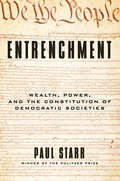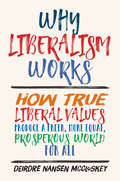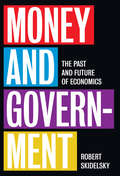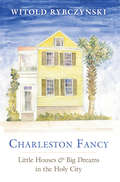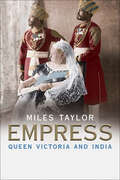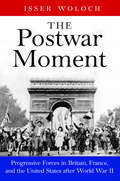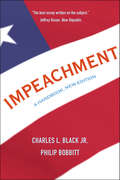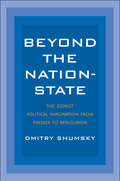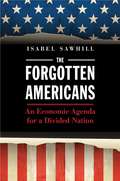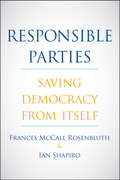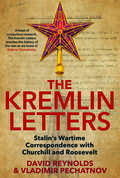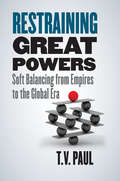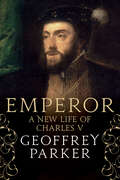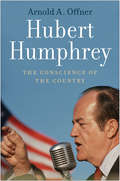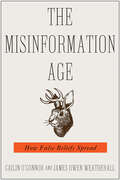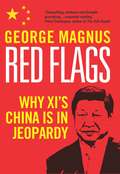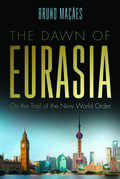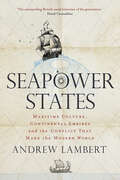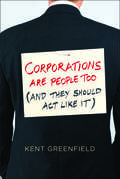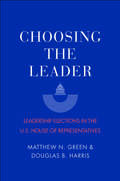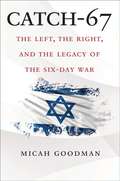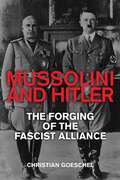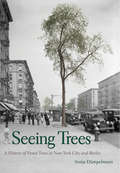- Table View
- List View
Entrenchment: Wealth, Power, and the Constitution of Democratic Societies
by Paul StarrAn investigation into the foundations of democratic societies and the ongoing struggle over the power of concentrated wealthMuch of our politics today, Paul Starr writes, is a struggle over entrenchment—efforts to bring about change in ways that opponents will find difficult to undo. That is why the stakes of contemporary politics are so high. In this wide-ranging book, Starr examines how changes at the foundations of society become hard to reverse—yet sometimes are overturned. Overcoming aristocratic power was the formative problem for eighteenth-century revolutions. Overcoming slavery was the central problem for early American democracy. Controlling the power of concentrated wealth has been an ongoing struggle in the world&’s capitalist democracies. The battles continue today in the troubled democracies of our time, with the rise of both oligarchy and populist nationalism and the danger that illiberal forces will entrench themselves in power. Entrenchment raises fundamental questions about the origins of our institutions and urgent questions about the future.
Why Liberalism Works: How True Liberal Values Produce a Freer, More Equal, Prosperous World for All
by Deirdre Nansen McCloskeyAn insightful and passionately written book explaining why a return to Enlightenment ideals is good for the world The greatest challenges facing humankind, according to Deirdre McCloskey, are poverty and tyranny, both of which hold people back. Arguing for a return to true liberal values, this engaging and accessible book develops, defends, and demonstrates how embracing the ideas first espoused by eighteenth-century philosophers like Locke, Smith, Voltaire, and Wollstonecraft is good for everyone. With her trademark wit and deep understanding, McCloskey shows how the adoption of Enlightenment ideals of liberalism has propelled the freedom and prosperity that define the quality of a full life. In her view, liberalism leads to equality, but equality does not necessarily lead to liberalism. Liberalism is an optimistic philosophy that depends on the power of rhetoric rather than coercion, and on ethics, free speech, and facts in order to thrive.
Money and Government: The Past and Future of Economics
by Robert SkidelskyA critical examination of economics' past and future, and how it needs to change, by one of the most eminent political economists of our time The dominant view in economics is that money and government should play only minor roles in economic life. Economic outcomes, it is claimed, are best left to the "invisible hand" of the market. Yet these claims remain staunchly unsettled. The view taken in this important new book is that the omnipresence of uncertainty makes money and government essential features of any market economy. Since Adam Smith, classical economics has espoused non-intervention in markets. The Great Depression brought Keynesian economics to the fore; but stagflation in the 1970s brought a return to small-state orthodoxy. The 2008 global financial crash should have brought a reevaluation of that stance; instead the response has been punishing austerity and anemic recovery. This book aims to reintroduce Keynes’s central insights to a new generation of economists, and embolden them to return money and government to the starring roles in the economic drama that they deserve.
Charleston Fancy: Little Houses and Big Dreams in the Holy City
by Witold RybczynskiA captivating chronicle of building in modern-day Charleston, making a case for architecture based on historical precedent, local context, and the ability to delight Charleston, South Carolina, which boasts America’s first historic district, is known for its palmetto-lined streets and picturesque houses. The Holy City, named for its profusion of churches, exudes an irresistible charm. Award-winning author and cultural critic Witold Rybczynski unfolds a series of stories about a group of youthful architects, builders, and developers based in Charleston: a self-taught home builder, an Air Force pilot, a fledgling architect, and a bluegrass mandolin player. Beginning in the 1980s, this cast of characters, exercising a kind of amateur mastery, produced an eclectic array of buildings inspired by the past—including a domed Byzantine drawing room, a fanciful medieval castle, a restored freedman’s cottage, a miniature Palladian villa, and a contemporary Mediterranean street. In his careful profiles of these protagonists and the challenges they have overcome in realizing their dreams, Rybczynski compellingly emphasizes the importance of architecture and urban design on a local level, how an old city can remake itself by invention as well as replication, and the role that individuals still play in transforming the urban landscapes around them.
Empress: Queen Victoria and India
by Miles TaylorAn entirely original account of Victoria’s relationship with the Raj, which shows how India was central to the Victorian monarchy from as early as 1837 In this engaging and controversial book, Miles Taylor shows how both Victoria and Albert were spellbound by India, and argues that the Queen was humanely, intelligently, and passionately involved with the country throughout her reign and not just in the last decades. Taylor also reveals the way in which Victoria’s influence as empress contributed significantly to India’s modernization, both political and economic. This is, in a number of respects, a fresh account of imperial rule in India, suggesting that it was one of Victoria’s successes.
The Postwar Moment: Progressive Forces in Britain, France, and the United States after World War II
by Isser WolochAn incisive, comparative study of the development of Post–World War II progressive politics in the United States, Britain, and France After the end of World War II, Britain, France, and the United States were faced with two very different choices: return to the civic order of pre-war normalcy or embark instead on a path of progressive transformation. In this ambitious and original work, Isser Woloch assesses the progressive agendas that crystalized in each of the three allied democracies, tracing their roots in the interwar decades, their development during wartime, the struggles to establish them after the war’s end, and the mixed outcome in each country. A fellow of the Guggenheim Foundation, the National Endowment for the Humanities, and the Institute for Advanced Study at Princeton, Woloch is a highly regarded scholar who adds the United States to a discussion that is usually focused solely on Europe. His enlightening work successfully argues that the postwar moment deserves a more prominent place in the history of progressive politics.
Impeachment: A Handbook
by Philip Bobbitt Charles L. BlackCharles L. Black Jr.’s classic guide to presidential impeachment, now in an updated edition with new material by Philip Bobbitt Originally published at the height of the Watergate crisis and reissued in 1998, two months before the second impeachment of a U.S. president, Charles Black’s Impeachment became the premier guide to the subject of presidential impeachment. Now thoroughly updated, it is essential reading for every concerned citizen.
Beyond the Nation-State: The Zionist Political Imagination from Pinsker to Ben-Gurion
by Dmitry ShumskyA revisionist account of Zionist history, challenging the inevitability of a one-state solution, from a bold, path-breaking young scholar The Jewish nation-state has often been thought of as Zionism’s end goal. In this bracing history of the idea of the Jewish state in modern Zionism, from its beginnings in the late nineteenth century until the establishment of the state of Israel, Dmitry Shumsky challenges this deeply rooted assumption. In doing so, he complicates the narrative of the Zionist quest for full sovereignty, provocatively showing how and why the leaders of the pre-state Zionist movement imagined, articulated and promoted theories of self-determination in Palestine either as part of a multinational Ottoman state (1882-1917), or in the framework of multinational democracy. In particular, Shumsky focuses on the writings and policies of five key Zionist leaders from the Habsburg and Russian empires in central and eastern Europe in the late nineteenth and early twentieth centuries: Leon Pinsker, Theodor Herzl, Ahad Ha’am, Ze’ev Jabotinsky, and David Ben-Gurion to offer a very pointed critique of Zionist historiography.
The Forgotten Americans: An Economic Agenda for a Divided Nation
by Isabel SawhillA sobering account of a disenfranchised American working class and important policy solutions to the nation’s economic inequalities One of the country’s leading scholars on economics and social policy, Isabel Sawhill addresses the enormous divisions in American society—economic, cultural, and political—and what might be done to bridge them. Widening inequality and the loss of jobs to trade and technology has left a significant portion of the American workforce disenfranchised and skeptical of governments and corporations alike. And yet both have a role to play in improving the country for all. Sawhill argues for a policy agenda based on mainstream values, such as family, education, and work. While many have lost faith in government programs designed to help them, there are still trusted institutions on both the local and federal level that can deliver better job opportunities and higher wages to those who have been left behind. At the same time, the private sector needs to reexamine how it trains and rewards employees. This book provides a clear-headed and middle-way path to a better-functioning society in which personal responsibility is honored and inclusive capitalism and more broadly shared growth are once more the norm.
Responsible Parties: Saving Democracy from Itself
by Ian Shapiro Frances RosenbluthHow popular democracy has paradoxically eroded trust in political systems worldwide, and how to restore confidence in democratic politics In recent decades, democracies across the world have adopted measures to increase popular involvement in political decisions. Parties have turned to primaries and local caucuses to select candidates; ballot initiatives and referenda allow citizens to enact laws directly; many places now use proportional representation, encouraging smaller, more specific parties rather than two dominant ones.Yet voters keep getting angrier.There is a steady erosion of trust in politicians, parties, and democratic institutions, culminating most recently in major populist victories in the United States, the United Kingdom, and elsewhere. Frances Rosenbluth and Ian Shapiro argue that devolving power to the grass roots is part of the problem. Efforts to decentralize political decision-making have made governments and especially political parties less effective and less able to address constituents’ long-term interests. They argue that to restore confidence in governance, we must restructure our political systems to restore power to the core institution of representative democracy: the political party.
The Kremlin Letters: Stalin's Wartime Correspondence with Churchill and Roosevelt
by David Reynolds Vladimir PechatnovA penetrating account of the dynamics of World War II’s Grand Alliance through the messages exchanged by the "Big Three" Stalin exchanged more than six hundred messages with Allied leaders Churchill and Roosevelt during the Second World War. In this riveting volume—the fruit of a unique British-Russian scholarly collaboration—the messages are published and also analyzed within their historical context. Ranging from intimate personal greetings to weighty salvos about diplomacy and strategy, this book offers fascinating new revelations of the political machinations and human stories behind the Allied triumvirate. Edited and narrated by two of the world’s leading scholars on World War II diplomacy and based on a decade of research in British, American, and newly available Russian archives, this crucial addition to wartime scholarship illuminates an alliance that really worked while exposing its fractious limits and the issues and egos that set the stage for the Cold War that followed.
Restraining Great Powers: Soft Balancing from Empires to the Global Era
by T. V. PaulHow subtler forms of balance-of-power politics can help states achieve their goals against aggressive powers without wars or arms races At the end of the Cold War, the United States emerged as the world’s most powerful state, and then used that power to initiate wars against smaller countries in the Middle East and South Asia. According to balance†‘of†‘power theory—the bedrock of realism in international relations—other states should have joined together militarily to counterbalance the U.S.’s rising power. Yet they did not. Nor have they united to oppose Chinese aggression in the South China Sea or Russian offensives along its Western border. This does not mean balance†‘of†‘power politics is dead, argues renowned international relations scholar T.V. Paul, but that it has taken a different form. Rather than employ familiar strategies such as active military alliances and arms buildups, leading powers have engaged in “soft balancing,” which seeks to restrain threatening powers through the use of international institutions, informal alignments, and economic sanctions. Paul places the evolution of balancing behavior in historical perspective from the post-Napoleonic era to today’s globalized world.
Emperor: A New Life of Charles V
by Geoffrey ParkerThis “elegant and engaging” biography dramatically reinterprets the life and reign of the sixteenth-century Holy Roman Emperor: “a masterpiece” (Susannah Lipscomb, Financial Times).The life of Emperor Charles V (1500–1558), ruler of Spain, Germany, the Netherlands, and much of Italy and Central and South America, has long intrigued biographers. But capturing the nature of this elusive man has proven notoriously difficult—especially given his relentless travel, tight control of his own image, and the complexity of governing the world’s first transatlantic empire.Geoffrey Parker, one of the world’s leading historians of early modern Europe, has examined the surviving written sources in Dutch, French, German, Italian, Latin, and Spanish, as well as visual and material evidence. In Emperor, he explores the crucial decisions that created and preserved this vast empire, analyzes Charles’s achievements within the context of both personal and structural factors, and scrutinizes the intimate details of the ruler’s life for clues to his character and inclinations. The result is a unique biography that interrogates every dimension of Charles’s reign and views the world through the emperor’s own eyes.
Hubert Humphrey: The Conscience of the Country
by Arnold A. OffnerOne of the great liberal politicians of the twentieth century, rediscovered in an important, definitive biography Hubert Humphrey (1911–1978) was one of the great liberal leaders of postwar American politics, yet because he never made it to the Oval Office he has been largely overlooked by biographers. His career encompassed three well†‘known high points: the civil rights speech at the 1948 Democratic Convention that risked his political future; his shepherding of the 1964 Civil Rights Act through the Senate; and his near†‘victory in the 1968 presidential election, one of the angriest and most divisive in the country’s history. Historian Arnold A. Offner has explored vast troves of archival records to recapture Humphrey’s life, giving us previously unknown details of the vice president’s fractious relationship with Lyndon Johnson, showing how Johnson colluded with Richard Nixon to deny Humphrey the presidency, and describing the most neglected aspect of Humphrey’s career: his major legislative achievements after returning to the Senate in 1970. This definitive biography rediscovers one of America’s great political figures.
The Misinformation Age: How False Beliefs Spread
by James Owen Weatherall Cailin O'Connor“Empowering and thoroughly researched, this book offers useful contemporary analysis and possible solutions to one of the greatest threats to democracy.” —Kirkus ReviewsEditors’ choice, The New York Times Book ReviewRecommended reading, Scientific AmericanWhy should we care about having true beliefs? And why do demonstrably false beliefs persist and spread despite bad, even fatal, consequences for the people who hold them?Philosophers of science Cailin O’Connor and James Weatherall argue that social factors, rather than individual psychology, are what’s essential to understanding the spread and persistence of false beliefs. It might seem that there’s an obvious reason that true beliefs matter: false beliefs will hurt you. But if that’s right, then why is it (apparently) irrelevant to many people whether they believe true things or not?The Misinformation Age, written for a political era riven by “fake news,” “alternative facts,” and disputes over the validity of everything from climate change to the size of inauguration crowds, shows convincingly that what you believe depends on who you know. If social forces explain the persistence of false belief, we must understand how those forces work in order to fight misinformation effectively.“[The authors] deftly apply sociological models to examine how misinformation spreads among people and how scientific results get misrepresented in the public sphere.” —Andrea Gawrylewski, Scientific American“A notable new volume . . . The Misinformation Age explains systematically how facts are determined and changed—whether it is concerning the effects of vaccination on children or the Russian attack on the integrity of the electoral process.” —Roger I. Abrams, New York Journal of Books
Red Flags: Why Xi's China Is in Jeopardy
by George MagnusA trusted economic commentator provides a penetrating account of the threats to China's continued economic rise Under President Xi Jinping, China has become a large and confident power both at home and abroad, but the country also faces serious challenges. In this critical take on China’s future, economist George Magnus explores four key traps that China must confront and overcome in order to thrive: debt, middle income, the Renminbi, and an aging population. Looking at the political direction President Xi Jinping is taking, Magnus argues that Xi’s authoritarian and repressive philosophy is ultimately not compatible with the country’s economic aspirations. Thorough and well researched, the book also investigates the potential for conflicts over trade, China’s evolving relationship with Trump, and the country’s attempt to win influence and control in Eurasia through the Belt and Road initiative.
Dawn of Eurasia: On the Trail of the New World Order
by Bruno MaçãesA bold, eye-opening account of the coming integration of Europe and Asia Weaving together history, diplomacy, and vivid personal narratives from his overland journey across Eurasia from Baku to Samarkand, Vladivostok to Beijing, Bruno Maçães provides a fascinating portrait of the shifting borderlands between Europe and Asia, tracking the economic integration of the two continents into a new supercontinent: Eurasia. As Maçães demonstrates, glimpses of the coming Eurasianism are already visible in China’s bold infrastructure project reopening the historic Silk Road, in the success of cities like Hong Kong and Singapore, in Turkey’s increasing global role, and in shifting U.S. foreign policy toward Europe and Asia. This insightful and clarifying book argues that the artificial separation of the world’s largest island cannot hold.
Seapower States: Maritime Culture, Continental Empires and the Conflict That Made the Modern World
by Andrew Lambert“A fascinating geopolitical chronicle . . . A superb survey of the perennial opportunities and risks in what Herman Melville called ‘the watery part of the world.’” —The Wall Street JournalIn this volume, one of the most eminent historians of our age investigates the extraordinary success of five small maritime states. Andrew Lambert, author of The Challenge: Britain Against America in the Naval War of 1812—winner of the prestigious Anderson Medal—turns his attention to Athens, Carthage, Venice, the Dutch Republic, and Britain, examining how their identities as “seapowers” informed their actions and enabled them to achieve success disproportionate to their size.Lambert demonstrates how creating maritime identities made these states more dynamic, open, and inclusive than their lumbering continental rivals. Only when they forgot this aspect of their identity did these nations begin to decline. Recognizing that the United States and China are modern naval powers—rather than seapowers—is essential to understanding current affairs, as well as the long-term trends in world history. This volume is a highly original “big think” analysis of five states whose success—and eventual failure—is a subject of enduring interest, by a scholar at the top of his game.“An intriguing series of stories of communities thinking seriously about how to stand their own ground when outpowered, how to do so in ways that are consistent with their values, and sometimes how to negotiate the descent from being a great power when the cards just aren’t in their favor any more. These are timely questions.” —Times Higher Education Supplement“Lambert is, without a doubt, the most insightful naval historian writing today.” —The Times
Supermarket USA: Food and Power in the Cold War Farms Race
by Shane HamiltonThis cultural history examines the global rise of American-style supermarkets during the Cold War era and how they shaped the way we eat today.Supermarkets were invented in the United States, and from the 1940s on they made their way around the world, often explicitly to carry American-style economic culture with them. This innovative history tells us how supermarkets were used as anticommunist weapons during the Cold War, and how their proliferation has shaped our current food system.The widespread appeal of supermarkets contributed to a “farms race” between the United States and the Soviet Union, as the superpowers vied to show that their contrasting approaches to food production and distribution were best suited to an abundant future. In the aftermath of the Cold War, US food power was transformed into a global system of market power, laying the groundwork for the emergence of our contemporary world, in which transnational supermarkets operate as powerful institutions in a global food economy.
Corporations Are People Too: (And They Should Act Like It)
by Kent GreenfieldWhy we’re better off treating corporations as people under the law—and making them behave like citizens Are corporations people? The U.S. Supreme Court launched a heated debate when it ruled in Citizens United that corporations can claim the same free speech rights as humans. Should corporations be able to claim rights of free speech, religious conscience, and due process? Kent Greenfield provides an answer: Sometimes. With an analysis sure to challenge the assumptions of both progressives and conservatives, Greenfield explores corporations' claims to constitutional rights and the foundational conflicts about their obligations in society. He argues that a blanket opposition to corporate personhood is misguided, since it is consistent with both the purpose of corporations and the Constitution itself that corporations can claim rights at least some of the time. The problem with Citizens United is not that corporations have a right to speak, but for whom they speak. The solution is not to end corporate personhood but to require corporations to act more like citizens.
Choosing the Leader: Leadership Elections in the U.S. House of Representatives
by Matthew N. Green Douglas B. HarrisThe first comprehensive study in more than forty years to explain congressional leadership selection How are congressional party leaders chosen? In the first comprehensive study since Robert Peabody’s classic Leadership in Congress, political scientists Matthew Green and Douglas Harris draw on newly collected data about U.S. House members who have sought leadership positions from the 1960s to the present—data including whip tallies, public and private vote commitments, interviews, and media accounts—to provide new insights into how the selection process truly works. Elections for congressional party leaders are conventionally seen as a function of either legislators’ ideological preferences or factors too idiosyncratic to permit systematic analysis. Analyzing six decades’ worth of information, Harris and Green find evidence for a new comprehensive model of vote choice in House leadership elections that incorporates both legislators’ goals and their connections with leadership candidates. This study will stand for years to come as the definitive treatment of a crucial aspect of American politics.
Catch-67: The Left, the Right, and the Legacy of the Six-Day War
by Micah Goodman Eylon LevyA controversial examination of the internal Israeli debate over the Israeli-Palestinian conflict from a best-selling Israeli author Since the Six-Day War, Israelis have been entrenched in a national debate over whether to keep the land they conquered or to return some, if not all, of the territories to Palestinians. In a balanced and insightful analysis, Micah Goodman deftly sheds light on the ideas that have shaped Israelis' thinking on both sides of the debate, and among secular and religious Jews about the Israeli-Palestinian conflict. Contrary to opinions that dominate the discussion, he shows that the paradox of Israeli political discourse is that both sides are right in what they affirm—and wrong in what they deny. Although he concludes that the conflict cannot be solved, Goodman is far from a pessimist and explores how instead it can be reduced in scope and danger through limited, practical steps. Through philosophical critique and political analysis, Goodman builds a creative, compelling case for pragmatism in a dispute where a comprehensive solution seems impossible.
Mussolini and Hitler: The Forging of the Fascist Alliance
by Christian GoeschelThis fresh treatment of Fascist Italy and Nazi Germany reveals how the close relationship between Mussolini and Hitler influenced both men.From 1934 until 1944 Mussolini met Hitler numerous times, and the two developed a relationship that deeply affected both countries. While Germany is generally regarded as the senior power, Christian Goeschel demonstrates just how much history has underrepresented Mussolini’s influence on his German ally.A scholar of twentieth-century Germany and Italy, Goeschel revisits all of Mussolini and Hitler’s key meetings to examine how they constructed a powerful image of a strong Fascist-Nazi relationship that still resonates with the general public. His portrait of Mussolini draws on sources ranging beyond political history to reveal a leader who, at times, shaped Hitler’s decisions and was not the gullible buffoon he’s often portrayed as. The first comprehensive study of the Mussolini-Hitler relationship, this book is a must-read for scholars and anyone interested in the history of European fascism, World War II, or political leadership.
Scots and Catalans: Union and Disunion
by John H. ElliottA landmark account that reveals the long history behind the current Catalan and Scottish independence movements A distinguished historian of Spain and Europe provides an enlightening account of the development of nationalist and separatist movements in contemporary Catalonia and Scotland. This first sustained comparative study uncovers the similarities and the contrasts between the Scottish and Catalan experiences across a five-hundred-year period, beginning with the royal marriages that brought about union with their more powerful neighbors, England and Castile respectively, and following the story through the centuries from the end of the Middle Ages until today’s dramatic events. J. H. Elliott examines the political, economic, social, cultural, and emotional factors that divide Scots and Catalans from the larger nations to which their fortunes were joined. He offers new insights into the highly topical subject of the character and development of European nationalism, the nature of separatism, and the sense of grievance underlying the secessionist aspirations that led to the Scottish referendum of 2014, the illegal Catalan referendum of October 2017, and the resulting proclamation of an independent Catalan republic.
Seeing Trees: A History of Street Trees in New York City and Berlin (Seeing Ser.)
by Sonja DümpelmannA fascinating and beautifully illustrated volume that explains what street trees tell us about humanity’s changing relationship with nature and the city Today, cities around the globe are planting street trees to mitigate the effects of climate change. However, as landscape historian Sonja Dümpelmann explains, the planting of street trees in cities to serve specific functions is not a new phenomenon. In her eye-opening work, Dümpelmann shows how New York City and Berlin began systematically planting trees to improve the urban climate during the nineteenth century, presenting the history of the practice within its larger social, cultural, and political contexts. A unique integration of empirical research and theory, Dümpelmann’s richly illustrated work uncovers this important untold story. Street trees—variously regarded as sanitizers, nuisances, upholders of virtue, economic engines, and more—reflect the changing relationship between humans and nonhuman nature in urban environments. Offering valuable insights and frameworks, this authoritative volume will be an important resource for years to come.
